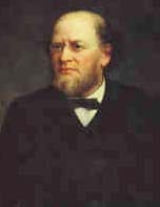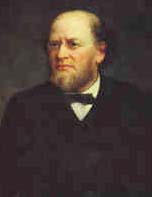
Archibald Alexander Hodge
Encyclopedia

United States
The United States of America is a federal constitutional republic comprising fifty states and a federal district...
Presbyterian leader, was the principal of Princeton Seminary between 1878 and 1886. He was the son of Charles Hodge
Charles Hodge
Charles Hodge was the principal of Princeton Theological Seminary between 1851 and 1878. A Presbyterian theologian, he was a leading exponent of historical Calvinism in America during the 19th century. He was deeply rooted in the Scottish philosophy of Common Sense Realism...
, named after the first principal of Princeton Seminary, Archibald Alexander
Archibald Alexander
Archibald Alexander was an American Presbyterian theologian and professor at the Princeton Theological Seminary...
.
Education and career
Hodge attended the College of New Jersey (later Princeton UniversityPrinceton University
Princeton University is a private research university located in Princeton, New Jersey, United States. The school is one of the eight universities of the Ivy League, and is one of the nine Colonial Colleges founded before the American Revolution....
) and Princeton Theological Seminary. He served as a missionary in India
India
India , officially the Republic of India , is a country in South Asia. It is the seventh-largest country by geographical area, the second-most populous country with over 1.2 billion people, and the most populous democracy in the world...
for three years (1847–1850). He held pastorates at Lower West Nottingham, Maryland
Maryland
Maryland is a U.S. state located in the Mid Atlantic region of the United States, bordering Virginia, West Virginia, and the District of Columbia to its south and west; Pennsylvania to its north; and Delaware to its east...
(1851–1855), Fredericksburg, Virginia
Fredericksburg, Virginia
Fredericksburg is an independent city in the Commonwealth of Virginia located south of Washington, D.C., and north of Richmond. As of the 2010 census, the city had a population of 24,286...
(1855–1861), and Wilkes-Barre, Pennsylvania
Wilkes-Barre, Pennsylvania
Wilkes-Barre is a city in the U.S. state of Pennsylvania, the county seat of Luzerne County. It is at the center of the Wyoming Valley area and is one of the principal cities in the Scranton/Wilkes-Barre metropolitan area, which had a population of 563,631 as of the 2010 Census...
(1861–1864). In 1864 he accepted a call to the chair of systematic theology
Systematic theology
In the context of Christianity, systematic theology is a discipline of Christian theology that attempts to formulate an orderly, rational, and coherent account of the Christian faith and beliefs...
in Western Theological Seminary
Pittsburgh Theological Seminary
Pittsburgh Theological Seminary, founded in 1794, is a graduate theological institution associated with the Presbyterian Church USA. It is located in the East Liberty neighborhood of Pittsburgh, Pennsylvania, USA and houses one of the largest theological libraries in the nation...
(later Pittsburgh Theological Seminary
Pittsburgh Theological Seminary
Pittsburgh Theological Seminary, founded in 1794, is a graduate theological institution associated with the Presbyterian Church USA. It is located in the East Liberty neighborhood of Pittsburgh, Pennsylvania, USA and houses one of the largest theological libraries in the nation...
) in Pittsburgh, Pennsylvania
Pittsburgh, Pennsylvania
Pittsburgh is the second-largest city in the US Commonwealth of Pennsylvania and the county seat of Allegheny County. Regionally, it anchors the largest urban area of Appalachia and the Ohio River Valley, and nationally, it is the 22nd-largest urban area in the United States...
. There he remained until in 1877 he was called to Princeton to be the associate of his father, Charles Hodge, in the distinguished chair of systematic theology. He took on the full responsibilities of the chair of systematic theology in 1878. This post he retained till his death in 1886.
Influence
At the time of his death, he was a trustee of the College of New Jersey and a leader in the Presbyterian Church. His interests extended widely beyond religion. He touched the religious world at many points. During the years immediately preceding his death he did not slacken his work, but continued his work of writing, preaching, lecturing, making addresses, coming into contact with men, influencing them, and by doing so widening the influence of ChristianityChristianity
Christianity is a monotheistic religion based on the life and teachings of Jesus as presented in canonical gospels and other New Testament writings...
.
Characteristics
Hodge's distinguishing characteristic as a theologian was his power as a thinker. He had a mind of singular acuteness, and though never a professed student of metaphysicsMetaphysics
Metaphysics is a branch of philosophy concerned with explaining the fundamental nature of being and the world, although the term is not easily defined. Traditionally, metaphysics attempts to answer two basic questions in the broadest possible terms:...
, he was essentially and by nature a metaphysician. His theology was that of the Reformed confessions. He had no peculiar views and no peculiar method of organizing theological
Theology
Theology is the systematic and rational study of religion and its influences and of the nature of religious truths, or the learned profession acquired by completing specialized training in religious studies, usually at a university or school of divinity or seminary.-Definition:Augustine of Hippo...
dogma
Dogma
Dogma is the established belief or doctrine held by a religion, or a particular group or organization. It is authoritative and not to be disputed, doubted, or diverged from, by the practitioners or believers...
s; in this he may be identified with his father, who claimed at the end of his life that he had taught and written nothing new. Though he taught the same theology that his father had taught before him, he was independent as well as reverent. His first book and that by which he is best known was his Outlines of Theology (New York
New York
New York is a state in the Northeastern region of the United States. It is the nation's third most populous state. New York is bordered by New Jersey and Pennsylvania to the south, and by Connecticut, Massachusetts and Vermont to the east...
, 1860; enlarged ed., 1878; reprinted 1996, ISBN 0-85151-160-0), which was translated into Welsh
Welsh language
Welsh is a member of the Brythonic branch of the Celtic languages spoken natively in Wales, by some along the Welsh border in England, and in Y Wladfa...
, modern Greek
Modern Greek
Modern Greek refers to the varieties of the Greek language spoken in the modern era. The beginning of the "modern" period of the language is often symbolically assigned to the fall of the Byzantine Empire in 1453, even though that date marks no clear linguistic boundary and many characteristic...
, and Hindustani
Hindustani language
Hindi-Urdu is an Indo-Aryan language and the lingua franca of North India and Pakistan. It is also known as Hindustani , and historically, as Hindavi or Rekhta...
. The Atonement (Philadelphia, 1867; reprinted 1989, ISBN 0-685-26838-1) is still one of the best treatises on the subject. This was followed by his commentary on the Westminster Confession of Faith
Westminster Confession of Faith
The Westminster Confession of Faith is a Reformed confession of faith, in the Calvinist theological tradition. Although drawn up by the 1646 Westminster Assembly, largely of the Church of England, it became and remains the 'subordinate standard' of doctrine in the Church of Scotland, and has been...
(1869, ISBN 0-8370-0932-4), a very useful book, full of clear thinking and compact statement. He contributed some important articles to encyclopedias – Johnson's, McClintock and Strong's, and the Schaff
Philip Schaff
Philip Schaff , was a Swiss-born, German-educated Protestant theologian and a historian of the Christian church, who, after his education, lived and taught in the United States.-Biography:...
-Herzog (the Schaff-Herzog encyclopedia furnished the kernel from which this article developed). He was one of the founders of the Presbyterian Review, to the pages of which he was a frequent contributor.
Sermons
In the Pulpit Hodge was a man of marked power. As he was not under the necessity of making fresh preparation every week, he had but few sermonSermon
A sermon is an oration by a prophet or member of the clergy. Sermons address a Biblical, theological, religious, or moral topic, usually expounding on a type of belief, law or behavior within both past and present contexts...
s, and he preached them frequently. They were never written; nor were they deliberately planned as great efforts. They grew from small beginnings and, as he went through the process of thinking them over as often as he preached them, they gradually became more elaborate and became possessed of greater literary charm.
Works of A. A. Hodge
- The Rule of Faith and Practice
- The Protestant rule of faith
- The Rules of Interpreting Scripture
- The Holy Scriptures - Canon and Inspiration (Part 1) (Part 2)
- The Inspiration of the Bible
- A. A. Hodge's commentary on the Entire Westminster Confession of Faith
- God - His Nature And Relation To The Universe
- Assurance and Humility
- A Short History of Creeds and Confessions
- God's Covenants With Man--The Church
- Baptism
- The Mode of Baptism
- Sactification (revised by B.B. Warfield)
- Free Will
- Outlines of Theology: Pelagianism, Semi-Pelagianism & Augustinianism
- Justification (Part 1) (Part 2) (Part 3)
- Predestination
- Selected Essays by Archibald Alexander Hodge
External links
- A short biography
- "Dogmatic Christianity, the Essential Ground of Practical Christianity" - Inaugural Address of Archibald Alexander Hodge, upon his installation as Associate Professor of Dogmatic and Polemic Theology at Princeton Theological Seminary, November 8, 1877.
- Photographic tour of A.A. Hodge's grave at Princeton Cemetery.
- More on Archibald Alexander Hodge from Logos Bible Software

